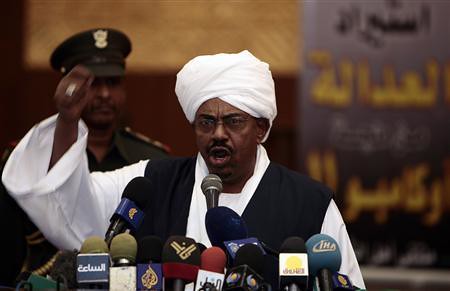
President Omar Hassan al-Bashir has remained defiant in the face of imperialist plots to destabilized the government of Sudan. The ICC issued a warrant for his arrest., a photo by Pan-African News Wire File Photos on Flickr.
Why does ICC only prosecute African leaders?
BY JEHRON MUHAMMAD | LAST UPDATED: APR 19, 2013 - 10:07:18 AM
(FinalCall.com) - Over 60,000 people attended Kenya’s presidential inauguration. African leaders in attendance included Nigeria’s Goodluck Jonathan, South Africa’s Jacob Zuma and President Yoweri Museveni of Uganda.
If one thought the presence of the 800-pound Gorilla in the room—the International Criminal Court (ICC) indictment that hangs over the head of Uhuru Kenyatta, Kenya’s newly elected president—was going to be kept quiet, you are wrong.
When it was his turn to speak, Museveni, according to the BBC, told the cheering audience, he applauded Kenyans for rejecting the “blackmail” of the ICC.
He said he supported the ICC in its original form, but now it was being used by “arrogant actors” who were trying to “install leaders of their choice in Africa and eliminate those they don’t like,” he said.
According to the Mail&Guardian, the case against Kenyatta and his deputy, William Ruto, which alleges “alleged orchestration of violence” that led during the 2007 elections to over 1,000 deaths is “unraveling.” Recently prosecutors dropped a crimes against humanity case that was filed against co-accused politician Francis Muthaura “after a key witness admitted lying—the first time in the 10-year-old court’s history that they have dropped a case so close to trial,” reported Mail&Guardian.
Museveni said the ICC has a stain that it is unable to wash away. The court’s image is that of an “instrument of the West” inherently biased against Africa, he said.
“From Joseph Kony up,” reported the Mail&Guardian, “all suspects indicted by the court to date are Africans, even if investigations are being conducted elsewhere and the current chief prosecutor, Fatou Bensouda, is from Gambia.”
Kenyatta unlike President Omar Bashir of Sudan (who was invited to the inauguration), who was also indicted by the ICC, has promised to fully co-operate. This has earned him brownie points with one of the ICC’s most prominent champions, Human Rights Watch. The watchdog organization, according to published reports, does not oppose diplomatic contacts with the new president.
The outcome appears to be Kenya is too big economically and too important strategically to British companies and the U.S. government respectively, to try and ocstrasize its government.
Jehron Muhammad, who writes from Philadelphia, can be reached at Jehronn@msn.com
No comments:
Post a Comment